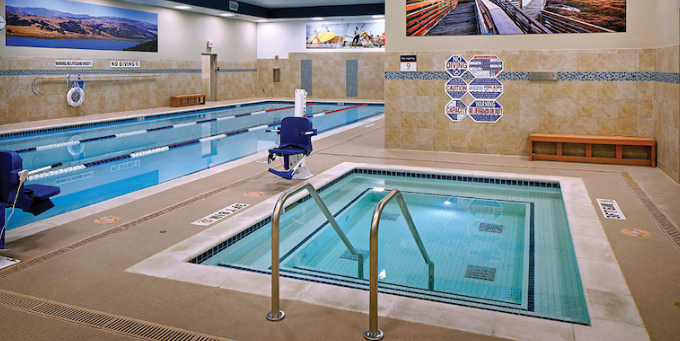The years of experience of our Sunasusa team are clear when comparing the restoring benefits of hot tubs and saunas for sore muscles. We provide information so you can select the most appropriate recovery technique for your requirements. Making the right decision between a hot tub and a sauna becomes essential when muscles feel discomfort, whether from frequent exercise or stress-related tension.
Hot tubs are a better option than saunas for speeding up the healing process for sore muscles. They reduce the accumulation of lactic acid, increase blood flow to the injured muscles, and encourage the production of growth hormones. Saunas have similar benefits to hot tubs, but they are not as strong. Hot tubs, as compared to saunas, can be used daily.
Table of Contents
Does Hot tub help Sore Muscles?
Hot tubs can help athletes by lowering lactic acid levels, which are a major contributor to sore muscles. Hot tubs can even stop the beginning of painful muscles when used before physical exercise. In addition to the health benefits of hot water, bathtubs frequently have jets that massage the body, promoting hydrotherapy-induced muscular relaxation.
Back pain, headaches, and arthritis are among the diseases that benefit from this type of treatment. The flotation of the water reduces strain on the body, relieving up to 90% of the body’s weight off the muscles and joints and promoting true relaxation.
Does Sauna help Sore Muscles?

Saunas are helpful to athletes because they stimulate blood flow and produce endorphins, which help in muscle repair. They promote the body’s synthesis of heat shock proteins, which are beneficial. Saunas for muscle recovery can also increase heart rate. They also help in losing fluid, which is necessary for the healing of muscles.
It is important to spend the right length of time in a cabin and profit from it. Growth hormone, or hGH, levels are higher in those who sweat for at least 20 minutes twice a week after an exercise routine. This hormone helps with muscle growth and post-surgical repair. It increases by at least 150% after sauna sessions.
Sauna vs Hot Tub

Hot tubs and saunas for recovery have similar functions, but if you have used either, you know they each provide something different. Both offer warmth and relaxation. Both spas and hot tubs use heat treatment to reduce stress, relax muscles, and provide other benefits, hot tubs are superior at accelerating muscle recovery.
They work better than spas because they minimize lactic acid accumulation, reduce inflammation, and improve blood flow to the muscles. While saunas provide comparable health advantages, they are not as effective as hot tubs. Hot tubs are a better option than saunas, even though both help in muscle repair.
Benefits and Risks of Sauna and Hot Tubs
Saunas and hot tubs have many advantages, but there are hazards as well.
Sauna Benefits
- Comfort: Spas help to promote relaxation and reduce tension by increasing circulation and generating endorphins.
- Detoxification: Sweat in a sauna facilitates the removal of pollutants from the body’s tissues through the skin.
- Better Circulation: The heat from spas causes blood vessels to dilate, which improves circulation and may lower blood pressure.
- Skin Cleansing: Baths can help cleanse the skin by promoting perspiration and pore opening.
- Discomfort Relief: After utilizing a sauna, several people report feeling less discomfort in their joints and muscles.
Sauna Risks
- Dehydration: If enough fluids are not taken, excessive perspiration in baths can result in dehydration.
- Overheating: Long-term exposure to high temperatures can lead to overheating, especially in individuals at risk like seniors or those with specific medical problems.
- Stress on the Circulatory System: Infrared use may strain the circulatory system, which may cause issues for those who already have heart problems.
- Illnesses: Exchanging baths with other people raises the possibility of transferring illnesses, such as allergies or colds.
Benefits of hot tubs
- Relaxation of the Muscles: Bathing in a hot tub can reduce discomfort, relieve tension, and rest the muscles.
- Better Quality Sleep: Some people may sleep better because of the peace that hot tubs offer.
- Tension Reduction: Hot tubs, like saunas, may help people relax and relieve tension.
- Relieving joint pain: Diseases like arthritis can cause joint pain, which can be effectively relieved by taking a hot bath.
- Socialization: Hot tubs may be a relaxing and sociable environment that encourages conversation and relaxation.
Hot tub risks
- Dehydration: If drinks are not replaced after using a hot tub, it is possible to become dehydrated, much like in spas.
- Overheating: If appropriate safety measures are not followed, continued exposure to extreme tub temperatures may result in overheating.
- Skin Irritation: Prolonged contact with chemicals in hot tubs or improperly kept water can cause rashes or skin irritation in certain people.
- Infections: If the water in a hot tub is not adequately treated and maintained, it may retain bacteria and other germs that increase the risk of illness.
- Sinking: There is a chance that someone might sink, particularly if they use drugs or alcohol before getting into the hot tub or if safety procedures are not followed.
Sauna vs Hot Tub for Sore Muscles
Hot tubs and saunas can provide good muscle soreness relief but they work in different ways. To reduce muscular soreness and promote healing by eliminating toxins, spas employ dry heat to raise heart rate and blood circulation. The heat helps in muscular relaxation and the reduction of stiffness.
Hot tubs combine hydrotherapy with heat. Because water is floating, it also relieves joint strain, which makes hot tubs very good for anyone with joint pain or injuries. The decision between a sauna and a hot tub for back pain comes down to personal taste and particular healing requirements.
Hot tub vs Sauna: Which is better for sore muscles?
Heat is a powerful treatment for relieving tense muscles and accelerating the healing process. However, hot tubs are the most effective option for relieving sore muscles when comparing the finest heat therapy types. Hot baths have several benefits for easing tense muscles:
- They help in lowering inflammation.
- They promote the synthesis of growth hormones and improve blood flow.
- They lower the muscles’ lactic acid levels.
- They offer a usually pleasant and calming emotion.
Saunas provide comparable health benefits, they are typically less efficient than hot tubs. Many research studies have examined the advantages of hot tubs and spas for the healing of muscles. Spas have been shown to have good effects on growth hormone levels, heart rate, lung function, and muscle rehabilitation for all types of athletes.
They are suitable to use before and after exercises and can even improve heart health. On the other hand, endorphin release, testosterone stimulation, muscular relaxation, and cellular regeneration are all significantly relieved by hot baths. Both baths and hot tubs are beneficial for sore muscles and athletes, hot tubs are the best choice in the end.
Why is a hot tub better for sore muscles?

Bathing in hot water may cause a rise in somatotropin, a growth hormone involved in cellular regeneration. Bathing in hot water helps lower cortisol, the stress hormone in the body. Reduced stress encourages relaxation, which reduces tight muscles. Athletes often have muscle pain as a result of lactic acid production.
Hot tubs are a great way to lower these levels, and relaxing before an activity can even completely avoid pain. Hot tub jets offer focused therapy treatments for tense muscles. These jets’ healing water pressure helps to relax muscles by acting as a massage. Hot tub therapy is helpful for several illnesses, including back pain and arthritis. Water’s gravity relieves pressure on muscles and joints, allowing for deeper relaxation.
Hot Tub and Inflammation
Exhaustion is typically the cause of sore muscles rather than inflammation. Hot tubs can effectively reduce inflammation, but remember that sore muscles are not always suggestive of inflammation. Overexertion is frequently the root cause of muscle pain. The effectiveness of hot water soaking in reducing muscular inflammation in people who are overweight and ineffective.
How Far and Often Can You Treat Soreness with a Hot Tub?

It is advisable to see your doctor before starting any new activity if you already have health problems. Adding hot tub time to pre- and post-workout schedules can greatly accelerate muscle repair for those who enjoy working out. Take a 20-minute or longer dip in a hot tub before starting your workout. This exercise improves blood flow and facilitates the release of tense muscles.
Give yourself enough time to calm down and get your heart rate back to normal after your workout before stepping into the hot tub. Waiting is advised before soaking oneself in hot water. Try to spend no more than 30 minutes in a 100°F tub or 15 minutes in a 104°F hot tub during your hot tub sessions.
Conclusion
Tight muscles may be irritating after hard exercises because they frequently return to our regular activities. An effective way to reduce the pain associated with strained muscles is to use heat therapy. Hot baths work better to relieve sore muscles than spas, even though both employ heat to lessen discomfort. Heat and pressure jets work in perfect balance in bathtubs to speed up muscle repair and reduce discomfort.
FAQs
The most frequently asked questions are given below:
Which is healthier, a hot tub or a sauna?
Hot tubs and saunas have been suggested to boost circulation, detoxify, and reduce weight. Their health effects are quite similar. Although they are a more recent creation, hot tubs might not have all of the advantages of baths.
Is the sauna better than the gym?
Since you are not using your muscles during a sauna session, they mustn’t have the same general health advantages as exercise. Any weight loss you may experience after using a sauna is momentary and is brought on by sweating out fluids.
How long should I sit in a sauna?
Experts often advise you to spend only fifteen to twenty minutes in a steam room. For most individuals, this is a decent place to start, but it’s crucial to pay attention to your body and take pauses if you feel discomfort.







